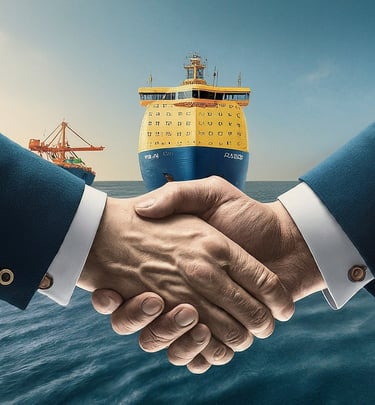The Vital Link: Chartering and Brokers in the Maritime Industry
This page explores the critical world of chartering and brokers in the maritime industry. We'll delve into their roles, how they operate, the future outlook of this sector, and showcase some of the top global companies facilitating these crucial transactions.
Who Are Charterers and Brokers?
Charterer: A charterer is a company or individual who hires a ship or a portion of its capacity for a specific voyage or period. They become the temporary owner for the designated timeframe, assuming responsibility for cargo, operation costs (excluding crew and fuel), and potential damages.
Broker: A ship broker acts as a neutral intermediary between shipowners (those offering vessels) and charterers (those seeking vessels). They bridge the gap, facilitating communication, negotiation, and finalizing charter agreements (known as charter parties).


What Do They Do?
Charterer:
Define cargo transportation needs (type of cargo, route, timeframe).
Identify suitable vessels based on size, capacity, and capabilities.
Negotiate charter terms (freight rate, duration, responsibilities) with shipowners through brokers.
Broker:
Maintain extensive networks of shipowners and charterers.
Match vessel availability with charterer requirements.
Facilitate negotiations and ensure smooth communication.
Draft and finalize charter party agreements.
May specialize in specific vessel types, cargo types, or geographical regions.
How Do They Operate?
The chartering process involves collaboration between charterers, brokers, and shipowners:
Charterer: Defines their needs and contacts a broker.
Broker: Finds suitable vessels, gathers information, and negotiates with both parties.
Negotiation: Freight rates, charter terms, and responsibilities are negotiated.
Charter Party: A legal agreement outlining the terms of the charter is drafted and signed.
Execution: The charter is executed, and the ship is placed under the charterer's temporary control for the agreed-upon period.
The Future View: A Look Ahead for Chartering and Broking
The chartering and broking sector is adapting to new challenges:
Digitalization: Online platforms and data analytics will streamline processes and enhance efficiency.
Sustainability Focus: Brokers may play a role in connecting environmentally conscious charterers with ships using cleaner technologies.
Shifting Trade Patterns: Adapting to evolving trade dynamics and geopolitical landscapes will be crucial.
Specialization: Brokers might further specialize in specific sectors due to growing industry complexity.
Top Global Chartering and Broking Companies:
The chartering and broking industry comprises established firms and emerging players. Here are some prominent global companies (in no particular order):
Clarksons Platou (UK): A leading global provider of shipbroking, ship finance, and maritime consultancy services.
Gibsons (UK): A well-established shipbroker specializing in dry cargo chartering.
Braemar ACM Shipbroking (UK): A prominent player in shipbroking with expertise in various sectors.
Howe Robinson (USA): A global provider of risk management, insurance, and employee benefits solutions, with a strong presence in shipbroking.
Jefferies (USA): A diversified financial services company with a shipping and transportation finance division.
Fearnleys (Norway): A leading independent shipbroker specializing in dry cargo and tanker markets.
Poten & Partners (USA): A global shipbroker with expertise in dry cargo, tankers, and LNG sectors.
Shelm CP (Switzerland): A leading shipbroker focused on chartering tankers and dry bulk vessels.
Galaxy Maritime (Greece): A prominent shipbroker specializing in dry cargo chartering.
Eastman Dillon (USA): A shipbroker with a strong presence in the dry cargo market.
Please note: This is not an exhaustive list. Numerous other chartering and broking companies operate worldwide, catering to diverse industry segments.
Conclusion: Chartering and brokers play an indispensable role in facilitating maritime trade.
By understanding their functions, future trends, and key players in the industry, you gain a deeper appreciation for the complex world of ship chartering and its impact on global shipping.


